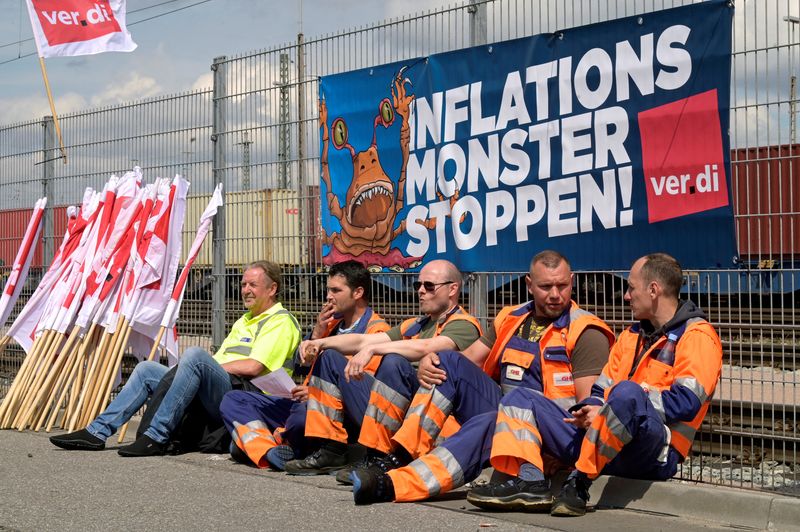High inflation fuels sense of rising inequality, mistrust of govt in Germany-survey
2023.08.09 12:47

© Reuters. FILE PHOTO: Workers sit in front of a banner reading “Stop the Inflation Monster” at the Burchardkai Container Terminal as they go on strike for higher wages in the harbour in Hamburg, Germany, June 9, 2022. REUTERS/Fabian Bimmer/File Photo
By Riham Alkousaa
BERLIN (Reuters) – Germany’s highest inflation in decades has fuelled a rising sense of inequality and left a majority of Germans feeling abandoned by the government, leading to gains for the far-right AfD party, a survey showed on Wednesday.
Some 80% said they considered the economic situation in Germany as unjust, up 32 percentage points from 2021, and 60% of Germans said they saw society as divided – principally between rich and poor – up 20 percentage points compared with May 2022, according to the More in Common research organization.
The findings come as support for Chancellor Olaf Scholz and his coalition slumps and the AfD capitalises on voter insecurity.
The AfD last month won a vote for a district leader for the first time and is on course to win three upcoming state elections in east Germany. Its rise has drawn concern from the domestic intelligence service about extremism.
“Where dissatisfaction is growing across the board, the potential number of those who openly support right-wing populists is also growing in its wake,” the study read, adding that 60% of Germans expect the economic situation to further deteriorate in the coming five years.
The survey of 2,016 people, in cooperation with Kantar Public polling institute, showed Germans blame both the government and Russia, following its invasion of Ukraine, for rising prices, at 45% and 47% respectively, and 68% said they felt abandoned by politicians during the cost of living crisis.
German inflation has been on a downward trend, but is still much higher than the European Union’s 2% target. German consumer prices rose by 6.5% on the year in July and the core inflation rate, which excludes volatile items such as food and energy, stood at 5.5% in July, down from 5.8% in June.
On Monday, a study by economic institute Ifo showed Germany’s middle class had shrunk between 2007 and 2019 to 63% of the population from 65%, falling behind 13 European countries in its share.
Low and middle income households have been generally hit harder by inflation, Florian Dorn, a researcher at Ifo told Reuters. Workers in Germany, Europe’s biggest economy, lost around 4.1% of their purchase power in 2022, research by the WSI institute published in July showed.
Although higher energy import prices initially drove inflation in Europe and Germany, companies were also putting up prices beyond their cost inflation, WSI analysis showed. Companies’ profit inflation rose by 7% in 2022 compared to an only 3.3% rise in labour costs.
“Inflation has made the misery much worse for some, but it’s just a bit of a nuisance for others who really live in abundance,” said Ulrich Schneider, managing director of German welfare association Der Paritaetische.








